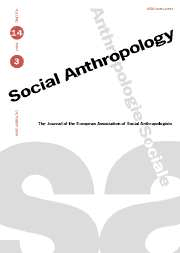
Social Anthropology
Scope & Guideline
Exploring the Tapestry of Human Cultures
Introduction
Aims and Scopes
- Ethnographic Research:
The journal emphasizes empirical research through ethnography, encouraging contributions that provide deep, nuanced insights into various cultures and social practices. - Interdisciplinary Approaches:
It promotes interdisciplinary research that connects anthropology with other fields such as sociology, political science, gender studies, and environmental studies, enriching the understanding of social phenomena. - Critical Engagement with Global Issues:
The journal addresses pressing global issues such as migration, climate change, human rights, and political conflicts, providing anthropological perspectives that highlight the human dimension of these challenges. - Reflexivity in Research:
A strong focus is placed on reflexivity and the ethical implications of anthropological research, encouraging authors to reflect on their positionality and the impact of their work. - Kinship and Social Relations:
Exploration of kinship structures, familial dynamics, and social relationships remains a core area, examining how these aspects shape identities and cultural practices. - Cultural Politics and Identity:
The journal investigates the intersections of culture, politics, and identity, focusing on how cultural narratives and practices influence social and political structures. - Environmental Anthropology:
A growing area of focus is the relationship between humans and their environments, particularly in the context of climate change and ecological sustainability.
Trending and Emerging
- Digital Anthropology:
With the rise of digital technologies, there is an increasing focus on digital anthropology, exploring how online spaces and digital practices shape social interaction and cultural expression. - Migration and Displacement Studies:
Research on migration, refugee experiences, and the politics of displacement has gained prominence, addressing urgent global crises and their anthropological implications. - Climate Change and Environmental Justice:
A notable trend is the emphasis on climate change and environmental justice, examining the cultural and social impacts of ecological transformations and advocating for sustainable practices. - Humanitarianism and Crisis Intervention:
The journal is increasingly publishing works that critique humanitarian efforts and explore the complexities of aid, compassion, and the politics surrounding crises. - Health and Illness in Context:
Emerging themes include the anthropological study of health and illness, particularly in the context of pandemics, global health policies, and local practices of care. - Posthumanism and Multispecies Relations:
There is a growing interest in posthumanism and the relationships between humans and non-human entities, reflecting broader discussions around ecology, agency, and ethics. - Political Economy and Social Inequality:
Research addressing the intersections of political economy and social inequality is trending, focusing on how economic structures influence social relations and cultural practices.
Declining or Waning
- Traditional Ethnographic Methods:
There appears to be a decrease in the emphasis on traditional ethnographic methods, with more authors opting for interdisciplinary methodologies that incorporate digital tools and data analysis. - Purely Descriptive Studies:
The journal has seen a reduction in purely descriptive ethnographic studies, as there is a growing expectation for contributions to engage critically with theory and contemporary debates. - Focus on Western Contexts:
There is a noticeable decline in studies focused solely on Western societies, as the journal increasingly prioritizes global perspectives and non-Western contexts. - Historical Anthropology:
Research focusing on historical anthropology has waned, with more emphasis being placed on contemporary issues rather than historical analysis of cultural practices. - Single-Country Studies:
The trend towards comprehensive, comparative studies across multiple regions or cultures has led to a decline in research centered exclusively on single country case studies.
Similar Journals
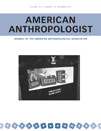
AMERICAN ANTHROPOLOGIST
Shaping the future of anthropology with impactful scholarship.American Anthropologist is a prestigious journal published by Wiley, dedicated to advancing the field of anthropology. With a rich publishing history dating back to 1888, it has become a leading platform for scholarly discourse, showcasing innovative research and diverse perspectives from around the globe. The journal holds impressive ranks within its categories, being recognized as Q1 in both Anthropology and Arts and Humanities, alongside a notable Scopus ranking of #36 out of 502 in Social Sciences. Its robust impact in academia is reflected in its emphasis on interdisciplinary approaches that resonate within the fields of social science and humanities. Researchers and students alike are encouraged to contribute to this vital resource that continues to shape anthropological thought and practice. For those interested, the journal is tailored for non-open access, ensuring the curation of high-caliber scholarly work accessible to a wide audience while supporting the standards of peer-reviewed publications.

Home Cultures
Unveiling the Cultural Narratives of Domestic SpacesHome Cultures is an esteemed academic journal published by Routledge Journals, Taylor & Francis Ltd, specializing in the interdisciplinary fields of Cultural Studies, Visual Arts, and Social Psychology. Since its inception in 2008, this journal has become a vital platform for researchers and practitioners to explore the complexities of domestic spaces and their cultural implications. With an impressive Scopus rank of #108 in Visual Arts and Performing Arts and a commendable Q2 quartile ranking in Cultural Studies, Home Cultures engages with innovative research that challenges conventional narratives within everyday environments. While the journal currently operates on a subscription basis, it offers valuable insight and promotes scholarly dialogue through its rigorously peer-reviewed articles. Positioned within the United Kingdom, Home Cultures continues to contribute significantly to the academic discourse on the interplay between home life and broader cultural phenomena.
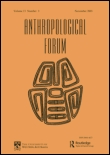
Anthropological Forum
Advancing Knowledge Through Innovative ResearchAnthropological Forum, an esteemed journal in the field of anthropology, is published by Routledge Journals, Taylor & Francis Ltd. With an ISSN of 0066-4677 and an E-ISSN of 1469-2902, the journal has cemented its reputation for fostering critical discussions and innovative research since its inception in 1963. Covering a broad range of topics within anthropology, it has achieved an impressive Q1 ranking in the category of Anthropology and a Q2 ranking in Arts and Humanities (miscellaneous) in 2023, showcasing its pivotal role in advancing scholarly discourse. With a Scopus ranking placing it in the top 10% of its field, the journal provides valuable insights into contemporary anthropological issues, making it an essential resource for researchers, professionals, and students alike. Although not an open-access journal, the comprehensive studies and articles published within its pages contribute significantly to the academic and professional community. Addressed out of Milton Park, Abingdon, UK, the Anthropological Forum remains a seminal platform for disseminating high-quality anthropological research.

ANTHROPOS
Exploring contemporary issues through an anthropological lens.ANTHROPOS is a distinguished journal published by NOMOS VERLAGSGESELLSCHAFT MBH & CO KG, anchoring its academic presence in Switzerland since its inception in 1983. With a commitment to advancing the fields of Anthropology and Arts and Humanities, this peer-reviewed publication serves as a vital platform for scholarly research, providing critical insights and fostering dialogue among researchers, professionals, and students alike. ANTHROPOS is categorized in Q3 for both Anthropology and the broader Arts and Humanities domains as of 2023, indicating its reputable yet emerging presence within these disciplines. Despite its significant contributions, the journal currently does not feature open access options, urging readers to engage through traditional academic channels. By embracing interdisciplinary approaches and contemporary issues, ANTHROPOS aims to illuminate complex cultural phenomena, making it an essential resource for anyone dedicated to understanding the intricacies of human societies.
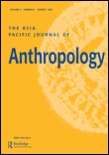
Asia Pacific Journal of Anthropology
Unveiling the Complexities of Human SocietiesAsia Pacific Journal of Anthropology is a premier academic journal dedicated to advancing the field of anthropology and cultural studies, published by Routledge Journals, Taylor & Francis Ltd. With an ISSN of 1444-2213 and E-ISSN 1740-9314, this journal has gained recognition for its rigorous scholarly contributions since its inception in 2000. Situated in the UK, it is strategically positioned to serve as a vital resource for researchers, professionals, and students exploring the rich complexities of human societies and cultures within the Asia Pacific region and beyond. As evidenced by its Q2 ranking in both anthropology and cultural studies for 2023, alongside its impressive Scopus ranks—#218 among 1304 in Cultural Studies and #157 among 502 in Anthropology—this journal illustrates a strong commitment to delivering high-quality, impactful research. While it is not an open-access journal, it remains a key platform for disseminating innovative research and fostering academic dialogue, thereby significantly contributing to the advancement of knowledge in the social sciences.

Anthropology in Action-Journal for Applied Anthropology in Policy and Practice
Advancing Policy through Cultural UnderstandingAnthropology in Action - Journal for Applied Anthropology in Policy and Practice, published by BERGHAHN JOURNALS, stands as a pivotal resource within the field of applied anthropology, addressing vital issues at the intersection of cultural insights and policy development. With an impressive Q1 ranking in Anthropology and a noteworthy position in the Scopus Ranks (Rank #70 of 502), this journal has solidified its influence as a premier platform for scholars and practitioners seeking to engage with contemporary societal challenges through a rigorous anthropological lens. Since becoming Open Access in 2018, the journal has enhanced accessibility to its rich array of scholarly articles, making critical research findings available to a broader audience. Covering a spectrum of topics from community practice to inform policy-making, Anthropology in Action aims to foster cross-disciplinary dialogue and promote the practical application of anthropological insights for real-world change. Whether you are a researcher, policymaker, or student, this journal serves as an essential navigational tool in the evolving landscape of applied anthropology.

Anthropology Today
Innovating Perspectives on Human BehaviorAnthropology Today, published by WILEY, is a leading peer-reviewed journal in the field of anthropology, boasting a distinguished Q1 category ranking in the 2023 evaluations and a notable position within the top 79th percentile of its discipline according to Scopus. Established in the United States, this journal offers a rich compendium of contemporary anthropological research, covering diverse topics that shape the understanding of human cultures and societies. It is recognized for its rigorous academic standards and commitment to publishing innovative studies that reflect current trends and discussions within the field. While the journal is not open access, it provides insightful articles and reviews that are indispensable for researchers, professionals, and students seeking to enhance their knowledge and stay updated with the latest anthropological findings and theoretical advancements.

CURRENT ANTHROPOLOGY
Exploring Cultures Through Rigorous ResearchCURRENT ANTHROPOLOGY, published by the esteemed University of Chicago Press, stands as a premier journal in the fields of anthropology and archaeology, with an impressive impact factor that signifies its relevance and authority in the academic community. With both print (ISSN: 0011-3204) and digital formats (E-ISSN: 1537-5382), this journal provides a platform for groundbreaking research, theoretical advancements, and critical discussions that shape our understanding of human cultures and societies. Since its inception in 1962, CURRENT ANTHROPOLOGY has continually pushed the boundaries of knowledge and inquiry, earning a prestigious Q1 ranking in 2023 across multiple categories, including Social Sciences and Archaeology. Researchers and professionals alike rely on this journal not only for its rigorous peer-reviewed articles but also for its commitment to interdisciplinary approaches and innovative methodologies. While not currently offering open access, CURRENT ANTHROPOLOGY remains an essential resource for students and scholars eager to stay abreast of the latest developments in anthropological research.

American Journal of Biological Anthropology
Unraveling the Mysteries of Human AdaptationThe American Journal of Biological Anthropology, published by WILEY, is a premier journal in the field of biological anthropology, boasting critical insights into human biological diversity, evolution, and adaptation. With its ISSN 2692-7691, this journal has established itself firmly within the research community, achieving a Q1 ranking in key disciplines such as Anatomy, Anthropology, Archeology, and Paleontology as of 2023. This indicates its significant impact, with Scopus rankings placing it in the top tiers across diverse fields, including a stellar rank of 13th out of 113 in Paleontology. Offering open access possibilities, the journal facilitates wider dissemination of groundbreaking research and is committed to advancing knowledge that intersects genetics, epidemiology, and anthropology. Based in the United States, the journal continually fosters an international dialogue among researchers, professionals, and students eager to explore the complexities of human biology through a robust and interdisciplinary lens.
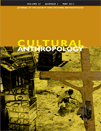
CULTURAL ANTHROPOLOGY
Transforming Access to Anthropological KnowledgeCULTURAL ANTHROPOLOGY is a premier journal in the field of anthropology, published by the esteemed SOC CULTURAL ANTHROPOLOGY. With an impressive impact factor and ranking in the Q1 category for both anthropology and arts and humanities, it stands as a leading platform for scholarly discourse and innovative research. Since transitioning to Open Access in 2014, the journal has made substantial contributions to the accessibility of anthropology literature, allowing a broader audience to engage with cutting-edge anthropological insights and findings. The journal's scope encompasses a wide range of cultural studies and anthropological perspectives, catering to a diverse readership that includes researchers, professionals, and students. Published from the Department of Anthropology, Rice University in Houston, Texas, CULTURAL ANTHROPOLOGY continues to shape the conversation in its field, promoting interdisciplinary dialogue and enriching the academic landscape.